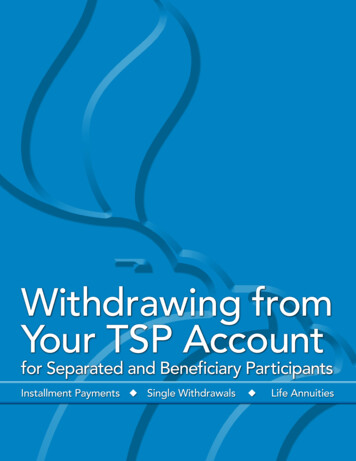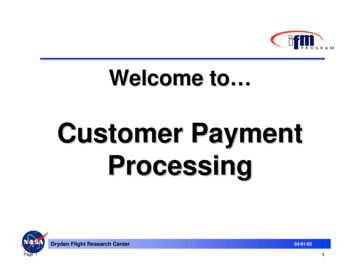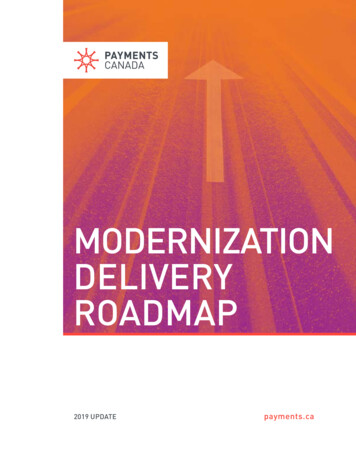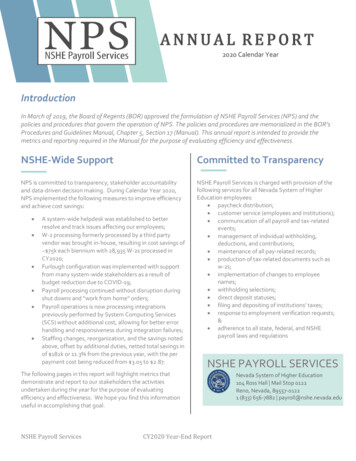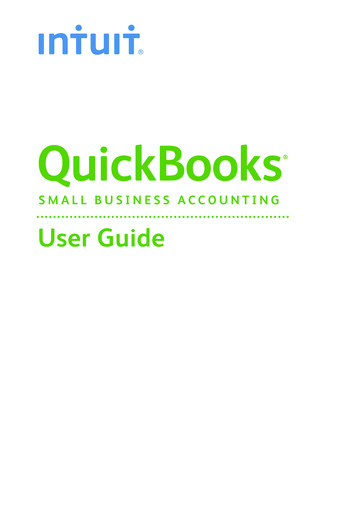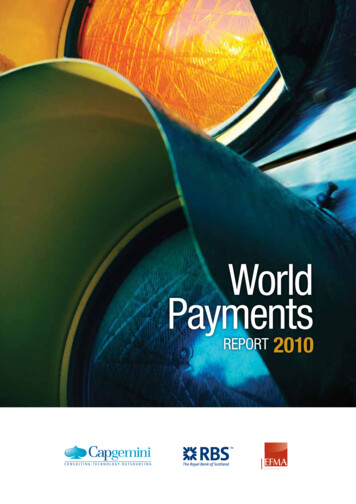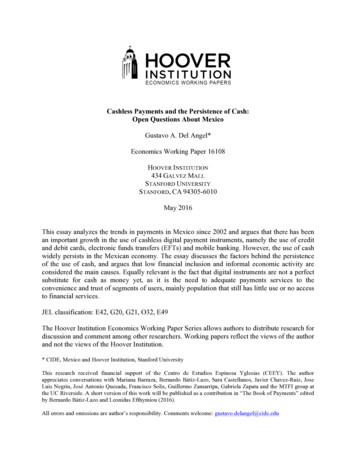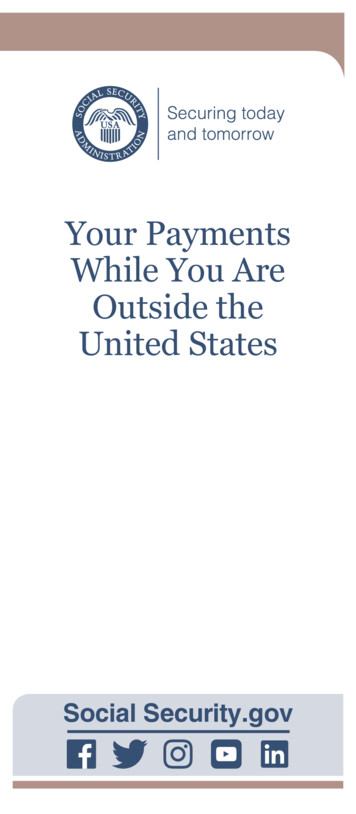
Transcription
Your PaymentsWhile You AreOutside theUnited StatesSocial Security.gov
What’s insideIntroduction1Payment restrictions1Your right to Social Securitypayments when you are outsidethe United States2Conditions for payments tocontinue while you are outsidethe United States4Additional residencyrequirements for dependentsand survivors9Countries that have socialsecurity agreements with theUnited States10Things you must report11How to report22Questionnaires22Advance Designation ofRepresentative Payee24What you need to knowabout Medicare25If your check is lost or stolen27
Electronic payments28Income tax30Contacting Social Security32
IntroductionThis booklet explains how being outsidethe United States may affect your SocialSecurity payments. It also providesinformation you need to report to us,and how to report it. Reporting changestimely helps to avoid overpayments andhelps you receive all the benefits youare entitled to.We calculate Social Security benefitsin U.S. dollars. We do not increaseor decrease your benefits because ofchanges in international exchange rates.Payment restrictionsTreasury Department sanctionsThe U.S. Department of the Treasuryprohibits making payments to personsresiding in Cuba or North Korea. Ifyou are a U.S. citizen residing in Cubaor North Korea, you can get all thepayments we withhold once you move toa country where we can send payments.Under the Social Security Act, if you arenot a U.S. citizen, you cannot receivepayments for the months you livedin Cuba or North Korea, even if yougo to another country and satisfy allother requirements.Other Treasury Department sanctionscould affect payments to persons inother countries. For information aboutU.S. Treasury sanctions, please visit1
s/Pages/Programs.aspx.Social Security restrictionsGenerally, we cannot send SocialSecurity payments to persons inAzerbaijan, Belarus, Kazakhstan,Kyrgyzstan, Moldova, Tajikistan,Turkmenistan, and Uzbekistan. However,we can make exceptions for certaineligible persons in these countries.To qualify for an exception, you mustmeet and agree to restricted paymentconditions. For more information aboutthese conditions and the qualificationsfor an exception, contact the SocialSecurity Administration or your FederalBenefits Unit. Contact information is inthe last section of this publication titled“Contacting Social Security.”If you do not qualify for an exception,we will withhold your payments until youleave the country with Social Securityrestrictions and go to a country where wecan send payments.Your right to Social Securitypayments when you are outsidethe United StatesIf you are a U.S. citizen, you maycontinue to receive payments outside theUnited States as long as you are eligiblefor payment and you are in a countrywhere we can send payments. If you are2
not a U.S. citizen, you must meet one ofthe conditions for payment described inthis publication.When we say you are “outside theUnited States,” we mean you are notin one of the 50 states, the District ofColumbia, Puerto Rico, the U.S. VirginIslands, Guam, the Northern MarianaIslands, or American Samoa for at least30 days in a row. We consider you tobe “outside the United States” until youreturn and stay in the United States forat least 30 days in a row. If you are not aU.S. citizen, you also may have to proveyou were lawfully present in the UnitedStates for that 30-day period.If you are not a U.S. citizen or youdo not meet one of the conditions forcontinued payments, we will stop yourpayments after you have been outsidethe United States for six full calendarmonths. Once this happens, we cannotstart your payments again until youcome back and stay in the UnitedStates for a full calendar month. Youmust be in the United States on thefirst minute of the first day of any monthand stay through the last minute ofthe last day of that month. In addition,we may ask you to prove you havebeen lawfully present in the UnitedStates for the full calendar month. Formore information, contact the SocialSecurity Administration or your FederalBenefits Unit. Contact information is inthe last section of this publication titled“Contacting Social Security.”3
Conditions for payments tocontinue while you are outsidethe United StatesIf you are not a U.S. citizen, you mustmeet the conditions described in thissection to continue receiving benefitsoutside the United States. You mustalso remain eligible for benefits andlive in a country where we can sendpayments. You can use the PaymentsAbroad Screening Tool to determinewhether you meet the conditions forpayments to continue while you areoutside the United States. The PaymentsAbroad Screening Tool is on ourwebsite at: www.ssa.gov/international/payments outsideUS.html.1. We will continue to pay your benefits if: You were eligible for monthlySocial Security benefits forDecember 1956. The worker on whose record yourbenefits are based died while in theU.S. military service or as a result ofa service-connected disability, andwas not dishonorably discharged.2. If you are receiving benefits basedon your own earnings and youmeet one of the conditions below,we will continue your U.S. SocialSecurity payments. If you arereceiving your payments as adependent or survivor, you mustalso meet the conditions listed inthis publication under the heading4
“Additional residency requirementsfor dependents and survivors.” The worker on whose record yourbenefits are based had railroad workthat the Social Security programtreated as covered employment. You are in the active military ornaval service of the United States.3. We will continue your U.S. SocialSecurity payments if you are a citizenof one of the countries listed below: Austria Japan Belgium Korea (South) Canada Luxembourg Chile Netherlands Czech Republic Norway Finland Poland France Portugal Germany Slovak Republic Greece Spain Hungary Sweden Ireland Switzerland Israel United Kingdom Italy(This list of countries is subject tochange. For the latest information,visit www.ssa.gov/international/countrylist1.htm.)4. If you are a citizen of one of thecountries listed below and you arereceiving benefits based on yourown earnings, we will continue yourU.S. Social Security payments. Ifyou are receiving benefits as adependent or survivor, you mustalso meet the conditions listed in5
this publication under the heading“Additional residency requirementsfor dependents and survivors.” Albania Lithuania Antigua and MacedoniaBarbuda Malta Argentina MarshallIslands Australia Bahama Islands Mexico Barbados Micronesia,Fed. States of Belize Monaco Bolivia Montenegro BosniaHerzegovina Nicaragua Brazil Palau Bulgaria Panama Burkina Faso Peru Colombia Philippines Costa Rica Romania Côte d’Ivoire Samoa(formerly CroatiaWestern CyprusSamoa) Denmark St. Kitts and DominicaNevis Dominican St. LuciaRepublic St. Vincent and Ecuadorthe Grenadines El Salvador San Marino Gabon Serbia Grenada Slovak Republic Guatemala Slovenia Guyana Trinidad-Tobago Iceland Turkey Jamaica Uruguay Jordan Venezuela Latvia Liechtenstein6
(This list of countries is subject tochange. For the latest information,visit www.ssa.gov/international/countrylist2.htm.)5. If you are a citizen of one of thecountries listed in the chart below,we will continue to pay your benefitsoutside the United States if:a) You are receiving benefits basedon your own earnings, and youearned at least 40 credits underthe U.S. Social Security systemor lived at least 10 years in theUnited States.b) You are receiving benefits as adependent or survivor of a workerwho earned at least 40 creditsunder the U.S. Social Securitysystem or lived in the United Statesfor at least 10 years. You mustalso meet the conditions under theheading “Additional residencyrequirements for dependents andsurvivors” in this publication. Afghanistan China Bangladesh Congo, Rep.of Bhutan Eritrea Botswana Ethiopia Burma Fiji Burundi Gambia Cameroon Ghana Cabo Verde Haiti CentralAfrican HondurasRepublic India Chad Indonesia7
stanSenegal Sierra LeoneSingaporeSolomonIslandsSomaliaSouth AfricaSri TunisiaUgandaYemen(This list of countries is subject tochange. For the latest information,visit www.ssa.gov/international/countrylist4.htm.)6. If you are a resident of a country thathas a U.S. social security agreement,(other than Austria, Belgium,Denmark, Germany, Sweden, orSwitzerland), we will continue yourU.S. Social Security payments. Youcan view a list of these countries inthis publication under the heading“Countries that have social securityagreements with the United States.”If you are a resident (but not citizen)of Austria, Belgium, Denmark,Germany, Sweden, or Switzerland,8
the social security agreements allowyou to continue to receive yourbenefits only if you are. A refugee or stateless person. Receiving dependent or survivorsbenefits on the record of a workerwho is (or was at the time ofdeath) a U.S. citizen, a citizen ofthe country where you reside, arefugee, or stateless person.Additional residencyrequirements for dependentsand survivorsIf you are a citizen of a country for whichwe require dependents and survivors tomeet additional residency requirements,you will have to show that you lived inthe United States for at least five years.During those five years, you must havebeen in the family relationship on whichwe based your benefits.However, the U.S. residencyrequirement does not apply if you meetany of the following conditions: You were initially eligible for monthlybenefits before January 1, 1985. Your entitlement is based on therecord of a worker who died duringU.S. military service or as a result of aservice-connected disease or injury. You are a citizen of a country listedunder number 3 in the sectiontitled “Conditions for payments to9
continue while you are outside theUnited States” in this publication. You are a resident of a country(other than Austria, Belgium,Denmark, Germany, Sweden, orSwitzerland) listed in the sectiontitled “Countries that have socialsecurity agreements with theUnited States” in this publication. Formore information about residency inAustria, Belgium, Denmark, Germany,Sweden, or Switzerland, see theheading, “Conditions for paymentsto continue while you are outsidethe United States.”A child who has not lived in the UnitedStates for five years can meet thefive-year residency requirement if theparent who is the worker, and the otherparent, have both lived in the UnitedStates for five years. However, we willnot pay children adopted outside theUnited States while they reside outsidethe United States, even if the child meetsthe residency requirement.Countries that have socialsecurity agreements with theUnited StatesCurrently, these countries have a socialsecurity agreement with the United States: Australia Chile Austria Czech Republic Belgium Denmark Brazil Finland Canada France10
GermanyGreeceHungaryIcelandIrelandItalyJapanKorea (South)LuxembourgNetherlands NorwayPolandPortugalSlovak RepublicSloveniaSpainSwedenSwitzerlandUnited KingdomUruguay(This list of countries is subject tochange. For the latest information,visit www.ssa.gov/international/countrylist3.htm.)For more information about internationalsocial security agreements, visitwww.ssa.gov/international/.Things you must reportBelow is a list of things you must reportto Social Security. You will find anexplanation of each item after this list.1. Change of address.2. Work outside the United States.3. If your disability improves, or youreturn to work, after qualifying fordisability benefits.4. Marriage.5. Divorce or annulment.6. Adoption of a child.7. Child leaves the care of a spouse orsurviving spouse.8. Child nearing age 18 is a full-timestudent or disabled.11
9. Death.10. Inability to manage funds.11. Deportation or removal from theUnited States.12. Changes in parental circumstances.13. Eligibility for a pension from work notcovered by Social Security.NOTE: Failure to report a changemay result in an overpayment. We willrecover any payments not due you. Also,if you fail to report changes in a timelyway or you intentionally make a falsestatement, we may stop your benefits.1. Change of addressTell us if your address changes so thechecks and mail we send you will not belost or delayed. Even if we are sendingyour payments to a bank or otherfinancial institution, report any change inyour home address.When you write to the Social SecurityAdministration about a change ofaddress, please type or print your newaddress carefully. Be sure to include thecountry and ZIP or postal code. Also, listthe names of all family members movingto the new address.2. Work outside the United StatesIf you work or own a business outsidethe United States and are younger thanfull retirement age, notify the SocialSecurity Administration or your FederalBenefits Unit. Contact information isin the last section of this publicationtitled “Contacting Social Security.”12
If you do not, we may charge apenalty. In addition, you may losebenefits under one of the worktests explained in this section.Full retirement age is 65 for peopleborn in 1937 or earlier. Beginning withpeople born in 1938, full retirement ageincreases gradually until it reaches age67 for those born in 1960 or later. Workafter full retirement age will not affectyour benefit payments.If you are under full retirement age, yourwork may affect the amount of yourmonthly benefit payment.Report your work to Social Security evenif you work only part-time or you areself-employed. Some examples of thetypes of work your report must includeare work as an apprentice, farmer, salesrepresentative, tutor, writer, etc. If youown a business, notify us even if you donot work in the business or make anyincome from it.If a child beneficiary (regardless of age)begins an apprenticeship, notify theSocial Security Administration or yourFederal Benefits Unit. We may consideran apprenticeship as work under theSocial Security program.We will consider your work outside theUnited States under either the foreignwork test or the annual retirement test.13
The foreign work testIf you are younger than full retirementage, we will withhold your benefitsfor each month you work more than45 hours outside the United States inemployment or self-employment notsubject to U.S. Social Security taxes. Itdoes not matter how much you earned orhow many hours you worked each day.If you are entitled to benefits as adependent of someone whose benefitswe must withhold because of the foreignwork test, we will also withhold yourbenefits for the same months, even if youare not working.Under the foreign work test, we considera person to be working any dayhe or she: Works as an employee orself-employed person. Has an agreement to work even ifthe person does not actually workbecause of sickness, vacation, etc. Is the owner or part owner of a tradeor business, even if the persondoes not actually work in the tradeor business, or the person does notmake any income from it.If you are a U.S. citizen or residentreceiving U.S. Social Security benefits,and you are working in a country thathas an international social securityagreement with the United States thatexempts your earnings from U.S. SocialSecurity taxes, your benefits are subjectto the foreign work test.14
These countries are listed in thispublication under the heading“Countries that have social securityagreements with the UnitedStates.” For more information abouthow an agreement may affect yourbenefits, contact the Social SecurityAdministration or your Federal BenefitsUnit. Contact information is in thelast section of this publication titled“Contacting Social Security.”The annual retirement testUnder certain conditions, Social Securitycovers work by U.S. citizens or residentsoutside the United States. If SocialSecurity covers your work, the sameannual retirement test that applies topeople in the United States applies toyou. Under the annual retirement test, youcan still get all benefits due for the year ifyour earnings do not exceed the annualexempt amount. This limit changes eachyear. To find out the current limit, contactthe Social Security Administration or yourFederal Benefits Unit. Contact informationis in the last section of this publicationtitled “Contacting Social Security.”If the annual retirement test applies toyou, and your earnings exceed the annualexempt amount, we will reduce someor all of your benefits by your earningsas follows: If you are younger than full retirementage, we withhold 1 in benefits foreach 2 in earnings above the limit.15
In the year you reach full retirementage, we will reduce your benefits by 1 for every 3 you earn above adifferent annual limit until the monthyou reach full retirement age. People who reach full retirement agecan get all of their benefits with nolimit on earnings.Count your earnings for the whole year tofigure the amount of benefits due you. Formost people, this means earnings fromJanuary through December. To figureyour total earnings for the year in whichyou first become entitled to benefits, countyour earnings for the months before andafter you became entitled.Your benefits as a child stop at age 18,unless you are a full-time student in anelementary or secondary school, or youare disabled. We count your earnings forthe entire year in which you reach age18 to figure the amount of benefits dueyou for the year. We do this regardless ofwhether your payments continue or stopat age 18.If you are entitled to benefits as adependent of someone whose work iscovered by Social Security, we will includeyour benefits in the amount we mustwithhold due to the earnings above thelimit in the annual earnings test.16
3. If your disability improves,or you return to work, afterqualifying for disability benefitsIf you get payments because you aredisabled, let us know right away if yourcondition improves and you go backto work. We will continue to send youpayments for up to nine months whenyou go back to work. This nine-month“trial work period” gives you a chance totest whether you are able to work withoutworrying about payments stopping. If,after nine months, you continue working,we will continue to pay you for threemore months.If you aren’t able to keep working afterthe trial work period, you will continue toget disability benefits.4. MarriageLet us know if you get married or ifsomeone receiving benefits basedon your earnings gets married, or ifsomeone in your care gets married. Insome cases, Social Security paymentsstop after marriage. In other cases, thepayment amount changes.5. Divorce or annulmentNotify us of your marriage annulment ordivorce. Divorce or annulment doesn’tnecessarily mean we will stop yourSocial Security payments. If you aregetting payments based on your ownwork record, divorce or annulmentof your marriage will not affect yourpayments. Also, if you are a spouse17
age 62 or older and you were marriedto the worker for 10 years or more, wewill continue your payments even ifyou divorce. Contact us if your namechanges, so your new name will appearon your payments.6. Adoption of a childWhen you adopt a child, tell us thechild’s legal name, the adoption decreedate, the country or U.S. state where theadoption took place, and the adoptingparents’ names and addresses.7. Child leaves the care of a spouseor surviving spouseIf you are a spouse or a survivingspouse receiving benefits because youare caring for a child who is under age16 or who was disabled before age 22,notify us right away if the child leavesyour care. If you do not, you could bepenalized and lose additional benefits.A temporary separation may not affectyour benefits as long as you still haveparental control over the child. Tell usif you or your child moves to anotherresidence or if you no longer areresponsible for the child. If the childreturns to your care, tell us that as well.8. Child nearing age 18 is afull-time student or is disabledWe will stop payments to a child whenthe child reaches age 18, unless thechild is unmarried and either disabled ora full-time student at an elementary orsecondary school.18
If a child age 18 or over gets paymentsas a student, notify us immediatelyif the student: Drops out of school. Changes schools. Changes from full-time topart-time attendance. Gets expelled or suspended. Is paid by his or her employer forattending school. Marries. Begins working.If a child whose payments were stoppedat age 18 becomes disabled before age22, or is unmarried and enters elementaryor secondary school on a full-time basisbefore age 19, notify us. We will thenresume payments to the child. Also, wecan start payments again if a child whorecovered from a disability becomesdisabled again within seven years.9. DeathIf a person who gets Social Securitybenefits dies, we do not pay benefitsfor the month of death. For example,if a beneficiary dies any time in June,someone must return the payment datedJuly (June payment) to Social Security.10. Inability to manage fundsSome people who get Social Securitypayments cannot manage their money.If that is the case, the beneficiary orbeneficiary’s caretaker should let usknow. We can arrange to send the19
payments to a relative or other person toact on behalf of the beneficiary. We callthis person a “representative payee.”We also offer the option to advancedesignate up to three individuals whocould serve as payee for you if theneed arises. For more information, readAdvance Designation of RepresentativePayee below.11. Deportation or removal fromthe United StatesIf you are deported or removed from theUnited States for certain reasons, we willstop your Social Security benefits. Wecannot restart your payments unless youare lawfully admitted to the United Statesfor permanent residence.Even if you are deported or removed,your dependents can get any benefitsfor which they qualify if they are U.S.citizens. If not, we will continue to payyour dependents’ benefits if they stay inthe United States for the entire month.However, we will not pay them benefitsfor any month if they spend any part ofthat month outside the United States.12. Changes in parentalcircumstancesWe may stop or start payments to a childwho is not a U.S. citizen when certainchanges occur. Let us know when thechild’s natural, adoptive, or stepparentdies, marries, or gets divorced (or has anannulment), even if that person doesn’treceive Social Security payments.20
13. Eligibility for a pension fromwork not covered by Social SecurityWe may reduce your U.S. SocialSecurity benefit if you become entitledto both a U.S. Social Security retirementor disability benefit and a retirement ordisability pension, such as foreign socialsecurity or a private pension, based, inwhole or in part, on work not covered byU.S. Social Security. When this is thecase, we may use a different formula tofigure your U.S. Social Security benefit.You should tell us if you start receiving aretirement or disability pension for worknot covered by U.S. Social Security.For more information, visit our website,www.ssa.gov, and read the publication,Windfall Elimination Provision(Publication No. 05-10045), or contactany U.S. Social Security office or FederalBenefits Unit. Contact information is inthe last section of this publication titled“Contacting Social Security.”By answering a few questions inthe WEP Screening Tool for foreignpensions, you can learn if the WindfallElimination Provision (WEP) willreduce your U.S. Social Securitybenefit. The WEP Screening Tool forforeign pensions is on our websiteat: www.ssa.gov/international/wep intro.html.21
How to reportYou can report by contacting us inperson, by mail, or by telephone. Forinformation about how to contact us, seethe last section in this publication titled“Contacting Social Security.” Whenyou contact us, include: The name of the person or personsabout whom the report was made. What is being reported and thedate it happened. The claim number (a nine-digitnumber—000-00-0000—followed bya letter or a letter and a number) orBNC# that appears on letters or othercorrespondence we send you.QuestionnairesWe send questionnaires to personsreceiving social security benefits (ortheir representative payees) outsidethe United States every year or everytwo years. Your answers will help usdetermine if you are still eligible forbenefits. This section will explain whenyou should receive a questionnaire. Ifyou do not receive your questionnairewhen you are supposed to, youshould contact the Social SecurityAdministration or your Federal BenefitsUnit. Contact information is in thelast section of this publication titled“Contacting Social Security.”It is important that you (or yourrepresentative payee) complete, sign,date, and return the questionnaire to22
us in the envelope provided with thequestionnaire as soon as possible. If youdo not, your payments will stop. If youfail to report or deliberately make a falsestatement, you could be penalized by afine or imprisonment. You also may losesome of your payments if you do notreport changes promptly.You will receive a questionnaire betweenMay and June every year if you: Are age 90 or over. Have a representative payee. Are not receiving benefits as a spouse,widow(er), parent, special age 72payments, or disabled widow(er).You will receive a questionnaire betweenMay and June every two years if you: Are receiving benefits as a spouse,widow or widower, parent, specialage 72 payments, or disabled widowor widower. Live in one of the countries in thelist below and you do not meet theconditions for an annual questionnaire.Countries where we mailquestionnaires every two years: Argentina Colombia Australia Costa Rica Austria Croatia Azores Cyprus Barbados Czech Republic Belgium Denmark Brazil Ecuador Canada El Salvador Chile Finland23
FranceGermanyGreeceGuatemalaHondurasHong ngoliaNauruNetherlands New ZealandNicaraguaNorwayPanamaPolandPortugalSan United KingdomVenezuelaIf you are supposed to receive aquestionnaire every two years, wewill mail your questionnaire in evennumbered years if the last two numbersof your Social Security number are 00through 49, or odd numbered years, ifthe last two digits of your Social Securitynumber are 50 through 99.Advance Designation ofRepresentative PayeeAdvance Designation is part of theStrengthening Protections for SocialSecurity Beneficiaries Act of 2018, whichwas signed into law on April 13, 2018.Advance Designation allows capableadult and emancipated minor applicantsand beneficiaries of Social Security,Supplemental Security Income, andSpecial Veterans Benefits to choose one24
or more individuals who could potentiallyserve as their representative payee inthe future, if the need arises.To help protect what’s important to you,we now offer the option to choose arepresentative payee in advance. If youare unable to manage or direct othersto manage your benefits in the future,you’ll have peace of mind knowing thatsomeone you trust, and have alreadychosen in advance, may be appointed tomanage your benefits.For more information, contact the SocialSecurity Administration or your FederalBenefits Unit. Contact information is inthe last section of this publication titled“Contacting Social Security.”What you need to knowabout MedicareMedicare is the U.S. national healthinsurance program for people who areage 65 or older, or disabled. Althoughthe Centers for Medicare & MedicaidServices (CMS) is the agency in chargeof the Medicare program, Social Securityprocesses your application for OriginalMedicare (Part A and Part B), and wecan give you general information aboutthe Medicare program.Medicare has four parts Medicare Part A (hospital insurance)helps pay for inpatient care in ahospital or limited time at a skillednursing facility (following a hospital25
stay). Part A also pays for somehome health care and hospice care. Medicare Part B (medical insurance)helps pay for services from doctorsand other health care providers,outpatient care, home health care,durable medical equipment, andsome preventive services. Medicare Advantage Plan (previouslyknown as Part C) includes all benefitsand services covered under Part Aand Part B — prescription drugs andadditional benefits such as vision,hearing, and dental — bundledtogether in one plan. Medicare Part D (MedicarePrescription drug coverage) helpscover the cost of prescription drugs.You have choices for how you getMedicare coverage. If you choose tohave Original Medicare (Part A and PartB) coverage, you can buy a MedicareSupplement Insurance (Medigap) policyfrom a private insurance company.Medicare generally does not cover healthservices you get outside the UnitedStates. Part A becomes available to youif you return to the United States. We donot withhold monthly premiums from yourbenefit payment for this protection.If you want Part B, you must enroll. If youdo, we normally will withhold a monthlypremium from your payment.Because Medicare benefits are availableonly in the United States, it may not beto your advantage to sign up and pay26
the premium for medical insurance ifyou will be out of the United States for along period of time. However, if you donot sign up, be aware that if you do soat a later date, you will pay a 10 percenthigher premium for each 12-monthperiod you could have been enrolled, butwere not.If you have Medicare Part B coverageand you want to cancel it, notify SocialSecurity. Premiums for Medicare Part Band associated premiums will continuefor one more month after the
Iceland Jamaica Jordan Latvia Liechtenstein Lithuania Macedonia Malta Marshall Islands Mexico Micronesia, Fed. States of Monaco Montenegro Nicaragua Palau Panama Peru Philippines Romania Samoa (formerly Western Samoa)

